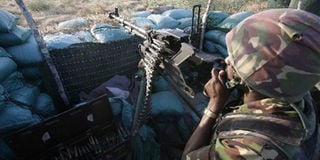EU budget cuts mean Kenya needs urgent exit strategy from Somalia

A Kenya Defence Force soldier attached to Amisom keeps guard at Afmadow Military Camp on the 23rd of January, 2014. PHOTO: EVANS HABIL/NATION
What you need to know:
- Although it has its own motives for its military intervention in Somalia, Kenya is also acting as a proxy for Western interests.
- As it stands, the government cannot guarantee the security of its citizens in Eastleigh or in Westlands, in Nairobi, Mombasa or Garissa.
Last week President Obama and NATO secretary general Anders Fogh Rasmussen, agreed measures to increase the North American Treaty Organisation’s military capacity in Europe.
NATO’s military officers and its member states’ political leaders are again talking of deploying troops to mainland Europe to prevent Russian aggression. An obvious question therefore arises: What happens to Kenya’s mission in Somalia if external funds dry up as a result of a long-term shift in European defence priorities?
This is not an imminent threat; NATO is not going to go to war over Crimea and there are many other reasons why all sides in the current dispute will do all they can to avoid any recurrence of the polarisation of the Cold War era.
Nevertheless, the words of Obama and Rasmussen are a reversal of the prevailing current of Western military strategy over the past two decades.
For much of the period since the end of the Cold War and particularly since 2001 the strategic focus of Western militaries has been on what can be loosely (and often misleadingly) termed ‘stabilisation’: the use of military force against states believed to pose threats in terms of terrorism or contravention of humanitarian norms.
There was much evidence of a declining Western enthusiasm for stabilisation missions even before the Crimean crisis. Under Obama, the military planners who designed the missions in Iraq and Afghanistan have lost their influence.
American-led attempts to stage a military intervention in Syria came to naught. France has been largely unsuccessful in its efforts to persuade allies to provide greater support to its campaigns in Mali and the Central African Republic.
Nevertheless, the spokesmen and women of NATO and its member states will doubtless argue that they are not confronted by a choice between global stabilisation and European defence. But the reality is quite different.
The political pressures from within NATO member states to concentrate on European defence are strong. The perceived threat to security posed by Russia is more immediate than that attributed to countries such as Iraq, Afghanistan or Somalia.
Perhaps most important of all, Western politicians and voters have become accustomed to shrinking defence budgets. There is neither the will nor the way to finance any significant increase in military spending so as to be able to afford renewed, increased commitments to European defence alongside stabilisation missions on a scale witnessed over the past decade.
FUNDING MAY DECLINE
So what does this mean for Kenya? Its mission in Somalia is part of the stabilisation agenda. Although it has its own motives for its military intervention in Somalia, Kenya is also acting as a proxy for Western interests.
EU members, in particular the UK, consider Somalia to represent a significant, direct threat to their own security. Put simply, they think that the lack of state authority in Somalia has created a vacuum that has allowed for the growth of a radical Islamist terrorist organisation that poses a threat to the security of their citizens.
That argument has led to significant European funding for the AMISOM mission, including picking up the bill for the allowances paid to Kenyan troops while they are in the field.
However, the importance — and therefore the funding — attached to Somalia may soon decline as the era of stabilisation comes to an end.
To a certain extent, the solution to this potential problem is simple: Kenyan troops can be withdrawn across the border at very short notice. But that ignores the much more dangerous war that is building at home and which has the potential to last much longer than the military mission in Somalia.
Operation Linda Nchi has, ironically, meant an increase in insecurity in Kenya. As it stands, the government cannot guarantee the security of its citizens in Eastleigh or in Westlands, in Nairobi, Mombasa or Garissa. Shoot-to-kill orders and mass arrests are indicative only of intelligence and security officers who have no idea who is behind the recent spate of terrorist attacks.
Such indiscriminate tactics, history tells us, are undertaken by almost every state when faced with such terrorist threats. But history, not least that of Britain and its empire, tells us that indiscriminate measures of the sort we are witnessing today in Kenya only serve to discredit the state and unify the presumed enemy.
Kenyan is entering into a war of attrition that is unsustainable, particularly in the event of changing global defence priorities.
At the end of the Cold War, governments across the African continent were taken by surprise by the new concerns of their Western allies.
As we again can see the beginning of a new but less dramatic shift in external priorities, those in power would do well to think about the possible outcomes.





